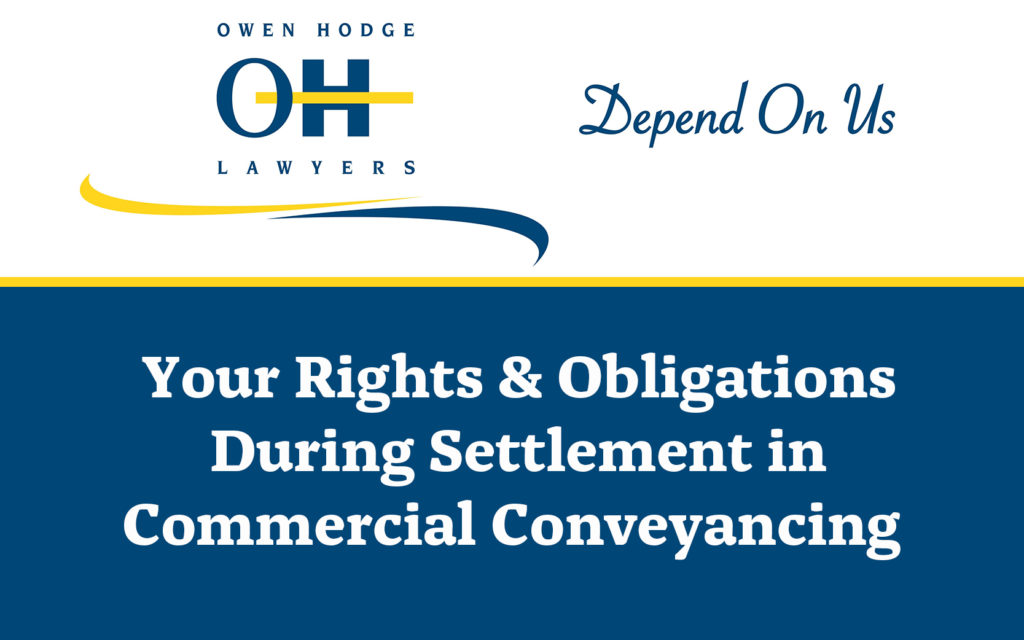
The last step in the commercial conveyancing process is the settlement. This is the phase during which ownership of the property legally passes from the seller to the buyer. A well-advised buyer should thoroughly understand the process and be prepared to:
- conduct a final inspection of the property;
- do a last review of any title issues;
- organise insurance;
- prepare for payment of the remaining purchase price;
- prepare for payment of taxes and fees; and
- collect the keys and security codes.
Settlement is usually attended by the buyer’s legal and financial representatives, but it is the buyer who remains ultimately responsible for monitoring the process to ensure that all goes as intended.
A last look at the property
At settlement, the property should be exactly as described in the contract: clean, in the agreed-upon state of repair, and with fixtures included or excluded as specified. The hot water system, heating and cooling units, walls, light fittings, windows, floor coverings and locks are among the items that deserve special attention. The savvy buyer will also check measurements.
The final inspection should take place in daylight, in the presence of the seller’s agent, and as shortly before the settlement as possible, certainly within the preceding week. The buyer should raise any issues as quickly as possible, so that they may be resolved without delaying the settlement.

A last look at the title
The title search will have already been conducted, but it is wise to take a last look to ensure that no new ownership interests have been created in the property since the search was completed. In addition it is important to make sure that any caveats on the property have been lifted so that a change of ownership may occur.
Make sure you are insured
It is risky to rely on the seller’s insurance during the period from the exchange of contracts to the date of the settlement. Even at the risk of duplicate coverage, make sure that your interest in the property is covered even before the settlement.
It’s all about the money
The buyer’s attorney generally holds the remainder of the purchase price in escrow until the date of settlement, at which point it is paid to the seller. It is the buyer’s responsibility, however, to make sure that the settlement amounts and payees are correct before that date.

All outgoings such as rates and other charges will be adjusted between the buyer and the seller. The seller is responsible for rates up to and including the day of settlement. The buyer is responsible as of the day after settlement.
As a word to the wise — always make sure that cheques have correct spellings. Incorrectly issued non-negotiable bank cheques can delay a settlement and cause completely unnecessary last minute headaches.
Taxes can catch buyers by surprise
Taxes triggered by the transfer of property include stamp duties and the Goods and Services Tax. Buyers should factor these into their final calculations.
State and territory stamp duty is imposed on some transfers of land and dealings with interests in land as well as on dealings in some interests in a company, trust or partnership. Sliding scales apply, with top rates between 4.5 and 7.0 percent. Stamp duties are usually paid by the buyer, although both parties may be liable.
A federal 10 percent GST applies to supplies of goods, real property and services, subject to some exemptions and concessions, including:
- exemptions for sales of going concerns and some farmland; and
- a ‘margin scheme’ concession (which broadly applies GST only to the difference between the sale price and the acquisition price).
The buyer usually pays GST to the seller at settlement, who remits it to the federal government.
Get the keys
Since buyers often do not attend the settlement, it is important to organise who will deliver the keys and to whom, usually the buyer’s agent or attorney. Buyers should also, make sure they have the codes for security devices, if any.
The attorneys at Owen Hodge Lawyers would be pleased to assist you in your purchase of commercial property. Call us at your earliest convenience at 1800 770 780 to arrange a consultation.
